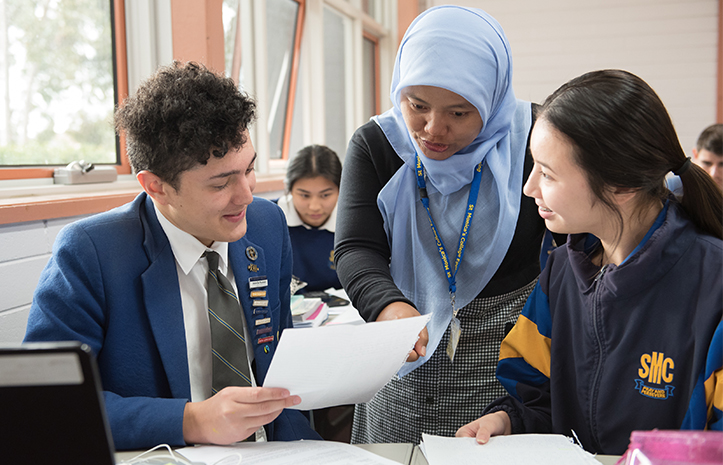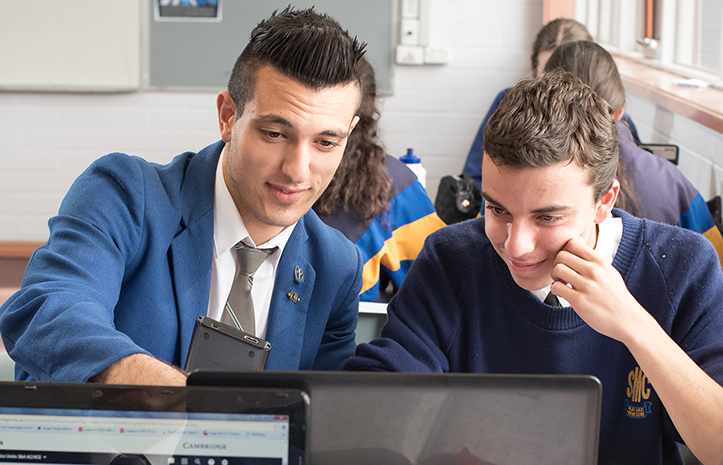by
User Not Found
| Feb 25, 2021
Dr Michiko Weinmann, Senior Lecturer Languages Education and Director CTaLL (Centre for Teaching and Learning Languages) at Deakin University and Dr Alistair Welsh, Senior Lecturer in Indonesian at Deakin University
Friday 26 February

As Australia adjusts to life in a new ‘COVID-normal’ in 2021, the realisation that the ways people around the world communicate, interact and collaborate has irrevocably changed, provides a timely impetus to pause and reflect what this means for languages.
The pandemic has highlighted the key role of languages in everything we do.
In 2020, grossly inaccurate translations in public health announcements from the Federal and Victorian Governments about important Covid-19 issues highlighted the importance of language professionals who work in our multilingual communities. Watching press conferences became an activity that many of us would not have been engaged in regularly before the pandemic. The presence of Auslan (Australian Sign Language) interpreters has contributed to make visible Australia’s Deaf community.
This reminded us of the richness of communication in the form of ‘sign language’ that uses 3D space, facial expressions, body movement and signs to create an elaborate visual form of communication.
Whether it be Auslan or another language, the ever-present need for language skills is a timely reminder that schools are a key space for developing opportunities for language study, and associated skills and attributes such as multilingual literacy, intercultural understanding and a global mindset.
From this year, Australian students keen to continue their language study beyond their schooling are being presented with new opportunities.
While not without controversy, Federal Government funding changes for universities focus on increasing the numbers of graduates in areas of expected employment growth. This includes languages and represents a renewed emphasis on incentivising languages study.

Image: Fees for courses that lead to jobs in high-priority sectors are set to be cut. Students take part in a classroom discussion.
Reduced course fees for university language study is a welcome and encouraging shift.
Many universities in Australia have a Diploma of Languages, offered in located, online and blended learning modes, enabling students from any course or faculty to add a language major to their study. The University Languages Portal Australia provides information about language study options across Australian universities.
The government's recognition of languages and intercultural understanding as key skills for the global workplace aligns with the growing trend of employers seeking graduates who can demonstrate these skills.
Job selection criteria often seek a demonstrated ability to work in culturally diverse workplaces.
Engaging with languages and diverse cultural settings demonstrates a potential for different, critical ways of thinking and problem-solving.
Put simply, many high-quality employers value language skills in their employees.
The New Colombo Plan Alumni ambassador program provides schools and students with access to young people whose passion for languages and cultures has helped them pursue an international career.
While overseas travel may be off limits for the moment, now may be the ideal time to start learning a language. Undoubtedly, the value of language learning is with an eye to the future, but it can also unlock new ways of engaging with multilingual communities right on our doorstep.
For decades, Australians have frequented overseas destinations, lured by exotic notions of other cultures. Yet we should also consider our multilingual communities right here.
Throughout Australia, we can find diverse communities where languages are a part of everyday life.

Image: The Asia Education Foundation at the University of Melbourne advocates for more second language learning at all stages of schooling.
Australia’s unique linguistic landscape is characterised by over 300 languages spoken in Australian homes, including Indigenous languages and dialects.
Language learners in Australia can access an infinite range of language resources through multilingual broadcasting, streaming services, and an ever-evolving digital world of apps and online sites.
Many cultural events such as international film festivals, markets, exhibitions and restaurants and culinary events have, despite the pandemic, continued in different formats.
Museums in Australia and worldwide, for example The Chinese Museum in Melbourne, now offer virtual programs, or have moved collections online, bringing cultural learning experiences directly into the classroom.
And let's not forget that many Australian students are already part of both located and virtual multilingual classrooms where their language of study may link to the languages their classmates speak, virtual school partnerships overseas and the connections they make with diverse languages and cultures through globalised popular culture.

Image: Learning a language online requires a heightened sense of autonomy to connect with a community of native speakers.
An interesting global trend emerging during the pandemic has been the growth in language study.
This might seem odd considering that much of the world has been effectively closed since early 2020, with limited opportunities for international travel and an uncertain job market. This highlights that the motivation for (re)embracing language learning goes beyond economic or career purposes.
Studying languages is fun, provides mental stimulation, focus and a sense of accomplishment – even if we may not know exactly where our language learning journey is going to take us.
Exposure to languages challenges our assumptions about other languages and cultures, and enriches how we connect, share experiences and build relationships. In times of separation across geographical and physical social spaces effected by the pandemic, this appears more important than ever.
Surely, now is the time to advocate for languages study – so our students are better equipped as global citizens, more capable of engaging in local and international communities, and ready to embrace new opportunities for when the world opens up.